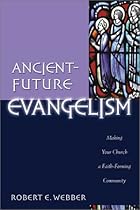Book Review: Ancient-Future Evangelism
 I have thoroughly enjoyed Robert Webber's Ancient-Future series, and I recently completed Ancient-Future Evangelism. Webber was an evangelical theologian that urged the church to look backwards as it looked forward; to find strategies for reaching the post-Christian world in the faith formation strategies of the pre-Christian world of the early church. As the book flap states, the book presents "A model of evangelism and discipleship firmly rooted in Scripture, attested to in the history of the church, and authentic to the postmodern world in which we live.
I have thoroughly enjoyed Robert Webber's Ancient-Future series, and I recently completed Ancient-Future Evangelism. Webber was an evangelical theologian that urged the church to look backwards as it looked forward; to find strategies for reaching the post-Christian world in the faith formation strategies of the pre-Christian world of the early church. As the book flap states, the book presents "A model of evangelism and discipleship firmly rooted in Scripture, attested to in the history of the church, and authentic to the postmodern world in which we live.Webber's tone is gracious, and his style is academic but easily accessible to all readers. He seemlessly weaves in quotes from ancient church leaders from Athanasius, Tertullian, and Augustine to modern authors such as Robert Clinton, Rick Warren, and Marvin Olasky.
Ancient-Future Evangelism focuses on the topics of faith formation, spiritual growth, and discipleship. It is both a primer in church history and a practical manual for implementing discipleship in our churches today. Webber begins by demonstrating that evangelism and discipleship are not two separate activities, but two parts of the same process of spiritual growth.
I'm particularly fascinated by Webber's encouragement to use rites of passage to help people define and mark their spiritual journeys. In most evangelical churches, the only two such rites are baptism and communion. At NCC, we are very intentional and strategic about trying to draw out the rich symbolism and to make them meaningful for participants. For instance, we create baptism videos to give to each baptism candidate and we give them each a towel to memorialize the day. At some communion services, we serve the communion elements in a special tin and bag that participants can take home with them to remember the experience. But I believe there are other rites of passage that the evangelical church could implement to help their people mark their steps. How can we help people cross the line of faith? How can we help them progress through different stages of spiritual development?
Webber uses the last section of the book to remind us of the story of our theology and how that story can be communicated to post-modern ears. His thesis is that we do not need new methods; we simply need to communicate the ancient truths of Scripture in a way that is understandable in a postmodern and post-Christian context.
I'm not quick to jump out and implement everything Webber advised, but his books always stretch me outside my current thinking, and they help me think critically and theologically about why we do what we do. If you are new to the Ancient-Future series, I would recommend reading Ancient-Future Faith first and then Ancient-Future Time.
 Sacred Roads: Exploring the Historic Paths of Discipleship
Sacred Roads: Exploring the Historic Paths of Discipleship
0 Comments:
Post a Comment
<< Home